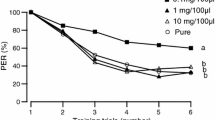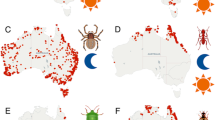Abstract
A few invertebrate models have been used for studying neurobiological and molecular aspects of associative learning. The ecological and evolutionary aspects of associative learning in these invertebrates are not yet well understood. To further this knowledge, I tested fruit fly larvae for their ability to learn to associate odors with preferred environmental conditions. The larvae learned to avoid odors associated with predation and to prefer odors associated with high-quality food, but failed to learn about odors associated with optimal temperature. It appears that the larvae possess a general ability to evaluate a suite of environmental parameters and associate preferred conditions with relevant stimuli.
Similar content being viewed by others
Author information
Authors and Affiliations
Additional information
Received: 6 May 1998 / Accepted after revision: 11 October 1998
Rights and permissions
About this article
Cite this article
Dukas, R. Ecological relevance of associative learning in fruit fly larvae. Behav Ecol Sociobiol 45, 195–200 (1999). https://doi.org/10.1007/s002650050553
Issue Date:
DOI: https://doi.org/10.1007/s002650050553




